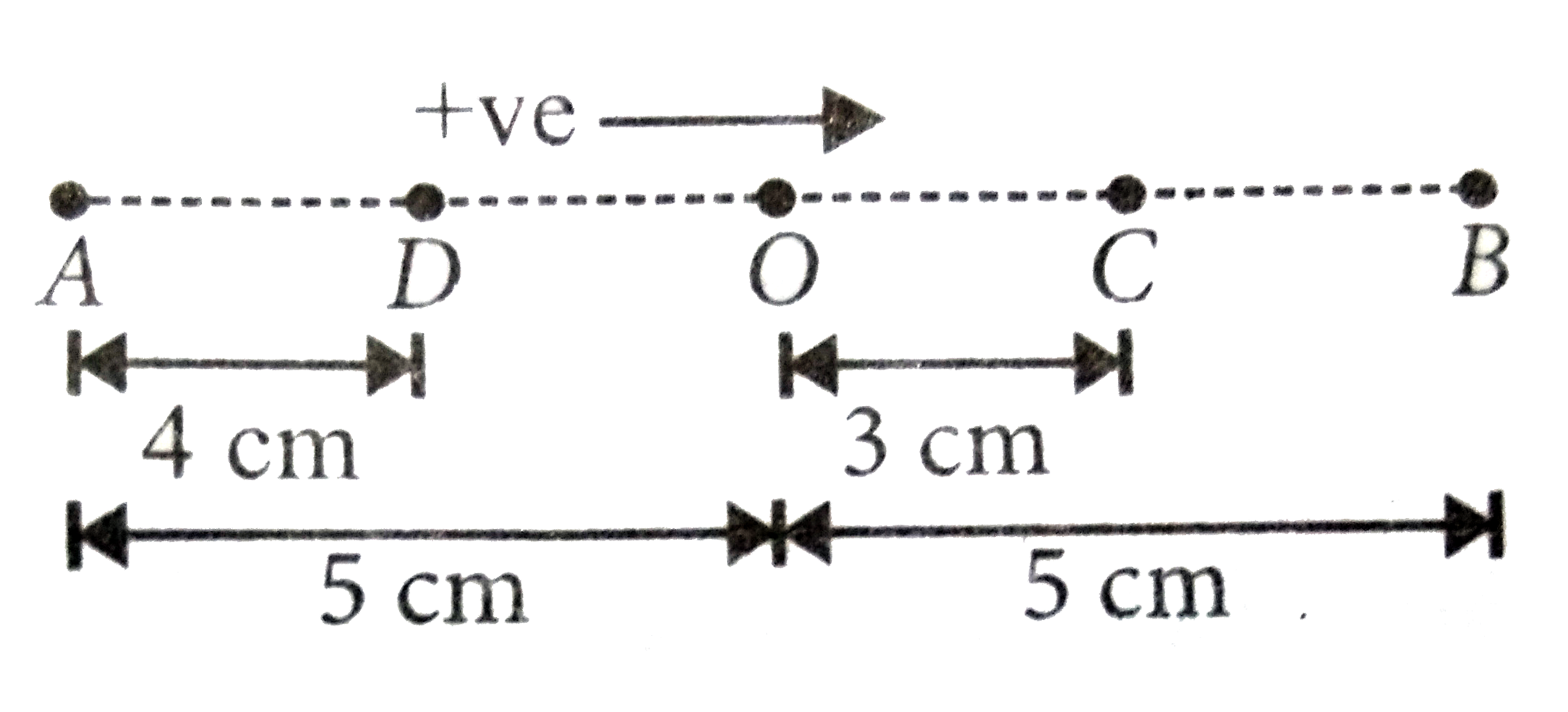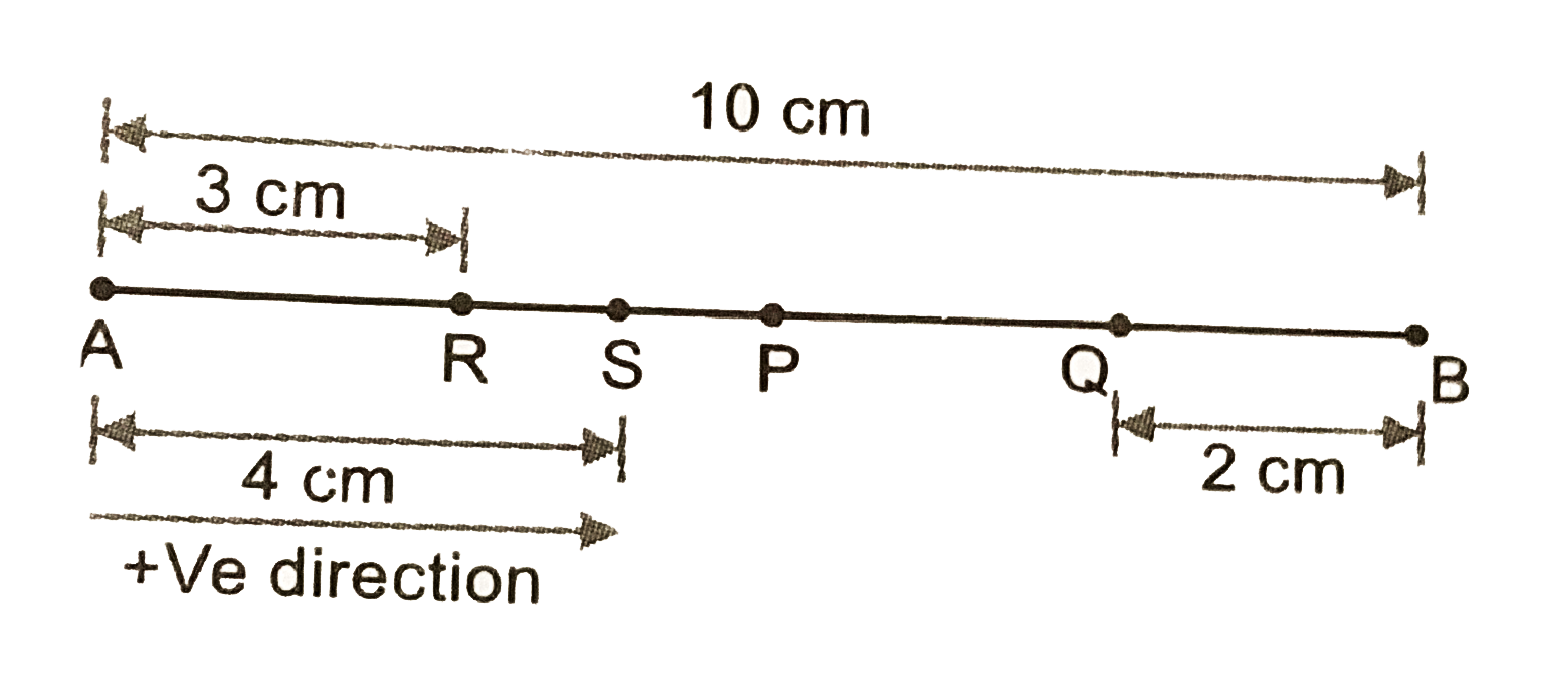A particle is in linear simple harmonic motion between two points. A and B, 10 cm apart (figure.) take direction from A to B as the positive direction and choose the correct statements.

AO= OB= 5cm
BC=8cm
The sign of acceleratio and force on the particle when it is at A is negative.
The sign of acceleration and force on the particle when it is at B is positive
The sign of velocity, acceleration and force on the particle when it is 3 cm away from A going towards B are positive
The sign of velocity, acceleration and force on the particle when it is 4 cm away from B going towards A are positive.
The correct Answer is:C
Refer figure, A and B are the extreme positions and O is the mean position.
For SHM, acceleration and force is always directed towards the mean position. It is given that the direction A to B is positive.


Topper's Solved these Questions
- OSCILLATIONS BOOK - NCERT FINGERTIPSCHAPTER - OSCILLATIONS EXERCISE - Force Law For Simple Harmonic Motion
2 Videos
- OSCILLATIONS BOOK - NCERT FINGERTIPSCHAPTER - OSCILLATIONS EXERCISE - Energy In Simple Harmonic Motion
11 Videos
- OSCILLATIONS BOOK - NCERT FINGERTIPSCHAPTER - OSCILLATIONS EXERCISE - Simple Harmonic Motion And Uniform Circular Motion
3 Videos
- MOTION IN A STRAIGHT LINEBOOK - NCERT FINGERTIPSCHAPTER - MOTION IN A STRAIGHT LINEEXERCISE - Assertion And Reason
15 Videos
- PHYSICAL WORLDBOOK - NCERT FINGERTIPSCHAPTER - PHYSICAL WORLDEXERCISE - Assertion And Reason
10 Videos
Similar Questions
A particle is in linear S.H.M. between two points A and B, 10 cm apart. Take the direction from A to B as the positive direction and give the signs of velocity, acceleration and force on the particle when it is.
(a) at the end (A) at the end B,
(c) at the mid point of AB going towards A,
(d) at 2 cm away from B going towards A,
(e) at 3 cm away from A goiing towards B, and
(f) at 4 cm away from A going towards A.

View SolutionA particle executes simple harmonic motion with an amplitude of 10 cm and time period 6s. Ast t=0 it is at position x=5 cm going towasrds positive x-direction. Write the eqwuation for the displacement x at time t. Find the magnitude of the acceleration of the particle at t=4s.
View Solution
Knowledge Check
A particle is in linear simple harmonic motion between two points A and B, 10 cm apart (figure) . Take the direction from A to B as the +ve direction and choose the correct statements.
 AThe sign of velocity, acceleration and force on the particle when it is 3 cm away from A going towards B are positive.BThe sign of velocity of the particle at C going towards O is negative.CThe sign of velocity acceleration and force on the particle when it is 4 cm away from B going towards A are negative.DThe sign of acceleration and force on the particle when it is at point B is negative.
AThe sign of velocity, acceleration and force on the particle when it is 3 cm away from A going towards B are positive.BThe sign of velocity of the particle at C going towards O is negative.CThe sign of velocity acceleration and force on the particle when it is 4 cm away from B going towards A are negative.DThe sign of acceleration and force on the particle when it is at point B is negative.A particle is in linear simple harmonic motion between two points A and B10cm apart (figure). Take the direction form A to B as positive direction and choose the correct statements.
AO=OB=5cm
BC=8cm
 AThe sign of velocity, acceleration and force on the particle when it is 3cm away from A going towards B are positiveBThe sign of velocity of the particle at C going towards B is negativeCThe sign of velocity, acceleration and force on the particle when it is 4cm away from B going towards A are negativeDThe sign of acceleration and force on the particle when it is at point B is negative
AThe sign of velocity, acceleration and force on the particle when it is 3cm away from A going towards B are positiveBThe sign of velocity of the particle at C going towards B is negativeCThe sign of velocity, acceleration and force on the particle when it is 4cm away from B going towards A are negativeDThe sign of acceleration and force on the particle when it is at point B is negativeA particle is executing simple harmonic motion between exterme positions given by (−1,−2,−3)cm and (1,2,1)cm. Its amplitude of oscillation is
A6cmB24cmC2cmD3cm
A particle executes simple harmonic motion with an amplitude of 10 cm. At what distance from the mean position are the kinetic and potential energies equal?
View SolutionA particle doing simple harmoonic motion amplitude =4cm time peiod =12sec The ratio between time taken by it in going from its mean position to 2cm and from 2cm to exterme position is
View SolutionA particle is vibrating in a simple harmonic motion with an amplitude of 4 cm . At what displacement from the equilibrium position, is its energy half potential and half kinetic
View SolutionThe equation of a simple harmonic oscillator with amplitude 5 cm and period 2 sec is if particle is starting from the mean positions is–
View SolutionA body is vibrating in simple harmonic motion . If its acceleration in 12cms−2 at a displacement 3 cm from the mean position, then time period is
View Solution
